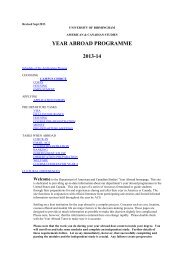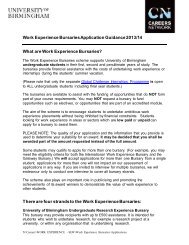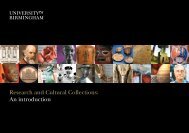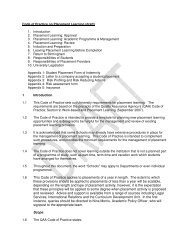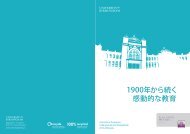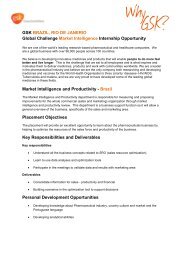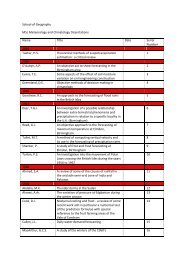BMag-2012 - University of Birmingham
BMag-2012 - University of Birmingham
BMag-2012 - University of Birmingham
You also want an ePaper? Increase the reach of your titles
YUMPU automatically turns print PDFs into web optimized ePapers that Google loves.
24 The <strong>Birmingham</strong> Magazine<br />
CREATING A<br />
NEW DIMENSION<br />
Technology pioneer Osman Kent (BSc Computer Science<br />
and Electrical Engineering, 1981) has been making waves<br />
throughout his career with cutting-edge developments.<br />
It is hard to remember a time when we didn’t<br />
own a PC or a Mac, couldn’t relive our favourite<br />
movies in 3D or wile away our time playing<br />
video games from the comfort <strong>of</strong> our homes.<br />
We have <strong>Birmingham</strong> graduate Osman Kent<br />
to thank for some <strong>of</strong> these guilty pleasures.<br />
Known as one <strong>of</strong> the founding fathers <strong>of</strong> the<br />
3D graphics revolution on the PC, serial<br />
technology and media entrepreneur Osman,<br />
originally from Turkey, first came to England to<br />
pursue his passion in music. With his parents’<br />
encouragement to study a more ‘proper’<br />
subject, he became part <strong>of</strong> the first cohort<br />
<strong>of</strong> students at <strong>Birmingham</strong> to study the joint<br />
honours programme, Computer Science<br />
and Electronics Engineering, developing<br />
the world’s first music transcription machine<br />
in his final year.<br />
‘It was a fascinating degree, but as we were<br />
the first ever intake, it wasn’t very organised,’<br />
Osman remembers. ‘I think we did just about<br />
everything the Computer Science and the<br />
Electronics Engineering students did and so<br />
it was very intense but I had a fantastic time.’<br />
He credits his time at <strong>Birmingham</strong> for helping<br />
to shape his ambitions which led to him<br />
becoming the co-founder and CEO <strong>of</strong> 3Dlabs,<br />
one <strong>of</strong> the fastest growing companies in<br />
Silicon Valley, USA and at one time a $1billion<br />
company on NASDAQ.<br />
‘I had so much encouragement from my tutors<br />
at <strong>Birmingham</strong> that I literally felt like I could<br />
change the world,’ he says. ‘The belief system<br />
made us all feel like we really could do anything<br />
we wanted and make a real difference and<br />
some <strong>of</strong> us have.<br />
‘I loved my time at <strong>Birmingham</strong> so much that I<br />
wanted to stay there forever. I applied for a job<br />
in the Computer Centre after graduation and it<br />
was my old pr<strong>of</strong>essor on the interview panel.<br />
He smiled at me and then refused to interview<br />
me, saying he would be doing the world a<br />
disservice by keeping me there. I was upset<br />
at the time, but with hindsight it is one <strong>of</strong> the<br />
best things anyone has ever done for me.’<br />
Doing exactly what he said he would never<br />
do after witnessing the trials and tribulations<br />
<strong>of</strong> his business-owner father, Osman, aged<br />
just 25, set up his own company with a fellow<br />
<strong>Birmingham</strong> graduate Dr Yavuz Ahiska (BSc<br />
Electrical Engineering, 1974). benchMark<br />
Technologies Ltd created the first computer<br />
with high-resolution graphics, transforming<br />
police fingerprinting stations and<br />
graphic animations.<br />
The giant DuPont corporation purchased<br />
benchMark for $12 million in 1988 and four<br />
years later, Osman and partner Yavuz Ahiska<br />
engineered a management buyout <strong>of</strong> DuPont<br />
and 3Dlabs was born. The world’s first<br />
graphics chip for PCs was developed<br />
by the company the following year which<br />
kickstarted the 3D revolution that has<br />
become so ubiquitous today.<br />
‘It’s quite nice to know that we had a hand<br />
in helping PCs become the workstation <strong>of</strong><br />
choice and the dominant graphics platform,’<br />
he explains. ‘Especially as it was such an<br />
audacious idea as neither <strong>of</strong> us had ever<br />
designed a chip in our lives.’<br />
With all <strong>of</strong> these amazing achievements behind<br />
him, it is a much more humbling moment which<br />
Osman points to as being the proudest <strong>of</strong> his<br />
pr<strong>of</strong>essional career.<br />
‘Around the time <strong>of</strong> September 11 the stock<br />
markets took a hit and the company went<br />
through a really tough time. We had a cash-<br />
flow crisis and it was looking likely that I<br />
would have to lay <strong>of</strong>f half our employees,’<br />
he remembers.<br />
‘The management team stood up and told the<br />
workforce that we were all taking 20% salary<br />
cuts, and I had agreed to an annual income <strong>of</strong><br />
$1. Of course we couldn’t force our employees<br />
to do the same, but we said any contribution<br />
they could make would have a real difference.<br />
I was in tears by the end <strong>of</strong> the night as without<br />
exception everyone in the company had<br />
reduced their salary by 10–20%. It was really<br />
inspiring to know that everyone believed in us




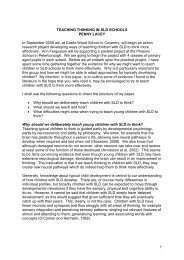
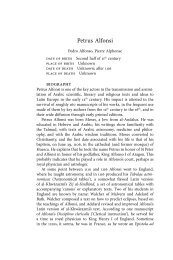
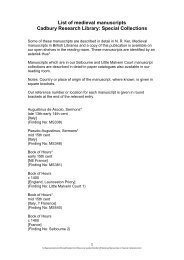
![Benyamin Asadipour-Farsani [EngD Conference abstract]](https://img.yumpu.com/51622940/1/184x260/benyamin-asadipour-farsani-engd-conference-abstract.jpg?quality=85)


